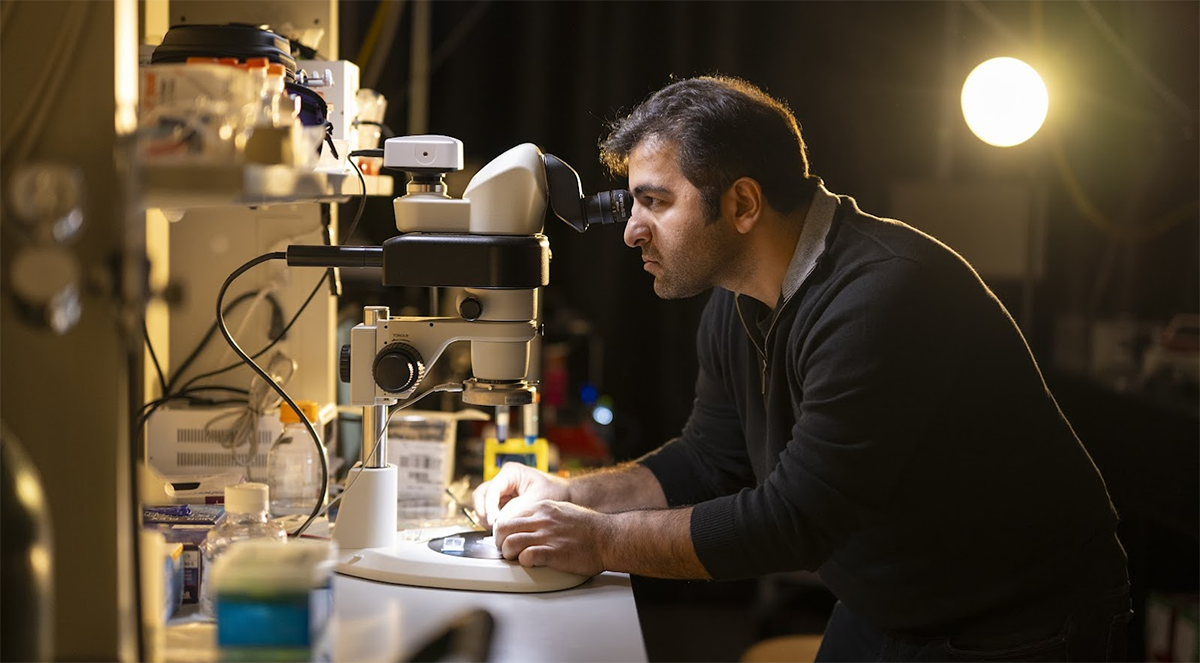How can we turn the tide on scientific mistrust
Of all the significant things that happened in 2024, the American research community may very well remember it as the year when America’s trust in science took a beating.
This wasn’t a passing trend or a political anomaly, or something that only came about because of the collective anguish of the COVID 19 pandemic. The numbers tell a different story.
According to the Pew Research Center’s annual surveys of public confidence in science, 87 percent of Americans in the year 2020 expressed either a fair amount or a great deal of confidence that scientists act in the best interests of the public. In 2024, that number fell to 76 percent (a slight improvement after bottoming out in 2023 at 73 percent).
Projecting across the U.S., that’s like losing the confidence of 35 million people in four years.
That shift in sentiment showed at the ballot box and is manifesting itself today in public policy. The narrative has moved from science being a great American success story worthy of bipartisan support, to an enterprise in need of deeper scrutiny and reform.

Brad Schwartz
I would argue that a top priority for science in the years ahead will be regaining that public trust — and it starts with simple, fundamental aspects of human nature. We need to remember that as human beings, we establish trust based mostly upon what we do and observe. We learn when we’re kids which people we can trust and which people we can’t. We also quickly learn it’s easier to lose trust than it is to earn it.
It might be tempting for scientists to be incredulous about this. After all, so much good has come from scientific discovery that has improved the human condition. We wear the white hats, right? But that’s not the way human nature works; it’s not all cold calculus. What we convey through our behaviors can have as big an impact as the end results of our work.
Here are some principles that I consider essential for science to get back on the right track.
Focus on the right metrics.
Universities and big research organizations often use grant dollars, papers published and citations as metrics for their success. It’s in their interest to drive that number as high as possible, and be able to say to the outside world, ‘Look how prestigious we are.’ This can lead us to construct our researcher support mechanisms and even our research aims around maximizing the number of grant dollars we bring in, rather than on optimizing the likelihood that the discoveries we make will be true and impactful.
We have constructed a set of incentives that demands researchers come up with remarkable findings in a short time frame, instead of constructing things in a way that serves finding the truth. Measuring success based on the scale of papers published and grants attained is self-serving and fails to convey why science matters.
Learn from disagreements.
This is something we did poorly during the pandemic. It’s important to recognize that disagreements are normal in science and they are ultimately productive. These disagreements can be very unpleasant, but they’re more likely to help us find the truth than simply “agreeing to disagree” and retreating to our respective corners. Too often our pandemic impulse was to shut down or denigrate those with different assessments of the threat and the best way forward. That arrogance was not earned, and we’re paying for it today.
Show more humility.
Like any other enterprise, science makes mistakes and operates best when in a state of continued self-correction, based on new knowledge. It’s painful to think back on some of those mistakes. Eugenics, for example, was considered on the cutting edge of scientific thinking in early to mid-20th century, before being recognized as a flawed theory that perpetuated racism and caused tremendous human damage. History is littered with similar flawed thinking masquerading as scientific fact.
When we think of the best attributes of science we use words like “honesty” and “integrity,” but I would put “humility” at the same level. The ability to say “Boy, I got that wrong,” rather than doubling down to protect reputations, would help immensely. There’s probably no surer way to guarantee that somebody is going to push back against you than conveying the attitude, “Here’s the truth and you’re a fool to disagree.”
“Believe” in the scientific method, not in science.
It was common to see and hear the phrase, “I believe in science,” throughout the pandemic. But science shouldn’t be treated like a priesthood. Science is a method of understanding how much confidence we should have in our knowledge. It represents a continual state of asking questions, gathering evidence, making conclusions and repeating experiments to prove we know what we think we know. Scientists should work to demystify the scientific process with the general public, showing people that it is a rigorous extension of how all humans learn — through trial and error and experience.
Engage with the society that supports you.
Another remarkable fact from the Pew survey is that while 89 percent of the public says scientists are highly intelligent, only 45 percent say scientists are good communicators. This must change. We need to stop thinking of communicating our work as a nice “extra” if we can find the time, and more as an essential way to continue societal support for our work.
Much like curiosity-driven research, public engagement is a marathon and not a sprint. We are not going to see overnight results. The principles outlined above are things we should try to bake into our professional practices — things we make time for in our lab meetings and research goals, and things that are amply measured in our rewards system.
The topic of trust simply can’t be over-emphasized. But in many respects we’re talking about it now out of a sense of self-preservation. If society was still embracing us as the most trustworthy profession, we may not be paying as much attention.
That would be a mistake. It’s something we can never take for granted.
Sincerely,
Brad Schwartz, M.D.
Carl Gulbrandsen Chair, Chief Executive Officer
Morgridge Institute for Research
Partnership by the Numbers
3,600+
Number of K12 Students Morgridge and UW–Madison science outreach leaders partnered to bring to campus in 2024.
8
Letters of support for NSF Broader Impact proposals
1
Inaugural Postdoc Expo
21
UW-Madison student organization partnerships
5
Morgridge professional development events
7
UW-Madison Colleges that participated in Morgridge programs
22
UW-Madison Departments that participated in Morgridge programs
2024 Milestones
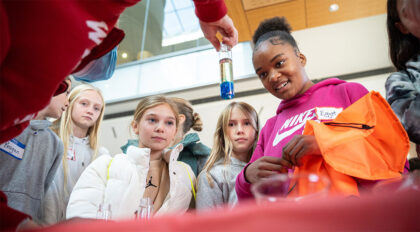
Morgridge, UW partner to supercharge field trip experiences for kids
A treasure trove of hands-on science experiences await K-12 students who visit UW-Madison. A Morgridge-UW partnership is helping schools get the biggest 'wow factor' from those visits.
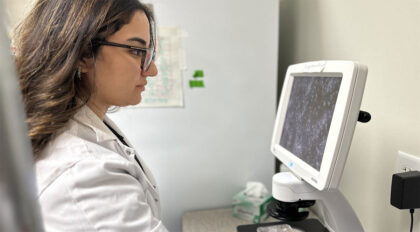
Rising Sparks: Sabina Farhadova, biomedical imaging
Working with investigators Melissa Skala and Darcie Moore, Farhadova will use cutting-edge imaging technologies to answer fundamental questions about neurogenesis – the process by which new neurons are generated in the brain – and stem cell biology.
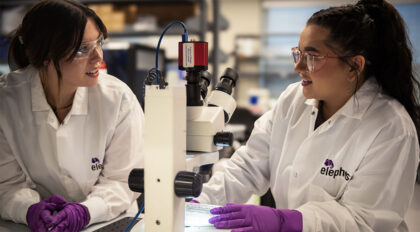
New cancer imaging startup harnesses Wisconsin expertise
Morgridge scientists are working with a Madison biomedical company to improve the success rates of cancer immunotherapy treatments, which harness patients' own immune response to fight cancer.
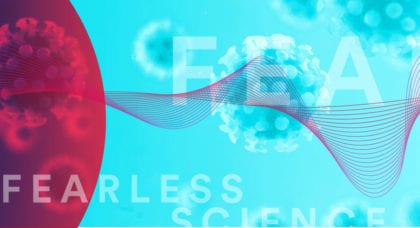
Earning Trust: How Can We Navigate Public Skepticism and Science Misinformation
Morgridge Investigators Pilar Ossorio and Dietram Scheufele joined CEO Brad Schwartz for a hybrid webinar to discuss why trust in science is breaking down and what can be done to earn public confidence.

Optical imaging technique gives a closer look at new ways to grow heart cells
Danielle Desa adapted optical imaging techniques she learned with the Melissa Skala Lab to assess the ideal conditions to successfully grow cardiac cells in unique biosynthetic hydrogels.

BioImaging North America Community Congress held in Wisconsin this fall
The BINA 2024 Community Congress will meet on September 23-27, 2024 on the University of Wisconsin–Madison campus.
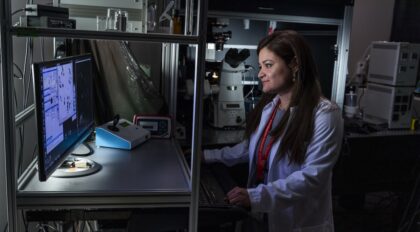
Advanced imaging reveals how a parasitic ‘kiss’ alters cell metabolism
Morgridge researchers harness the power of optical metabolic imaging to study how the parasite Toxoplasma changes host cell metabolism over the course of infection.

UW, Morgridge welcome new Rita Allen Civic Science Fellows
The Morgridge Science Communication Incubator Lab and the UW–Madison Life Sciences Communication Department welcome two new Civic Science Fellows supported by the Rita Allen Foundation.

New Morgridge investigator explores complex link between viruses, cancer
Viruses are responsible for nearly one in every five cases of human cancer. New Morgridge Investigator Megan Spurgeon is on the front lines of understanding the inner workings of this public health threat.

Morgridge Trustee James Dahlberg honored for entrepreneurial achievement
James Dahlberg, Morgridge trustee and former interim chief executive officer, is among three outstanding innovators to receive 2024 Chancellor’s Entrepreneurial Achievement Awards.
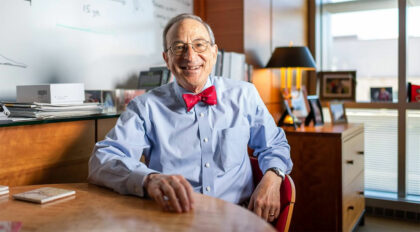
AAAS members make eight UW researchers new fellows
Morgridge Institute CEO Brad Schwartz and Morgridge Visiting Scientist James Keck are among eight University of Wisconsin–Madison scholars who have been elected fellows of the American Association for the Advancement of Science (AAAS), the world’s largest general scientific society.

Heart regeneration pioneer to join UW–Madison, Morgridge Institute
Kenneth Poss explores the mysteries of how some species can regenerate virtually any damaged tissue in their body — and what that could mean for repairing damaged human hearts.

AI in Biomedicine: Promises and Pitfalls
Does AI have a future in biomedical research? What challenges might we face? Experts from the Morgridge Institute addressed these questions during a Fearless Science Speaker Series lecture on March 21, 2024.
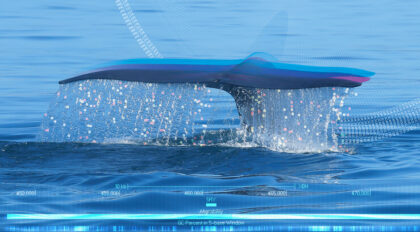
All creatures great and small: Sequencing the blue whale and Etruscan shrew genomes
Researchers illustrated that size doesn't matter when they assembled sequences for two new reference genomes — one from the world’s largest mammal and one of the smallest.
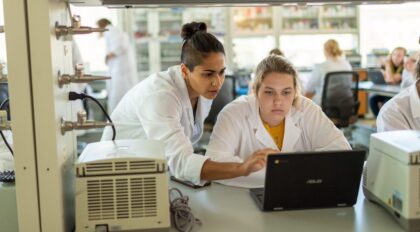
Scientists more likely to engage with the public when supported by their research institutions
The Morgridge Science Communication Incubator Lab questions why scientists may or may not be willing to pursue public engagement opportunities.
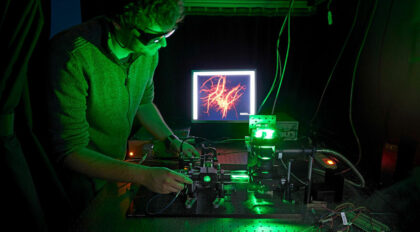
Morgridge scientist aims to shatter the ‘ballistic barrier’ in imaging
With support from the Chan Zuckerberg Initiative (CZI), Morgridge investigator Randy Bartels will be on a quest to break the “ballistic barrier” in biomedical imaging to peer more deeply into living tissue.
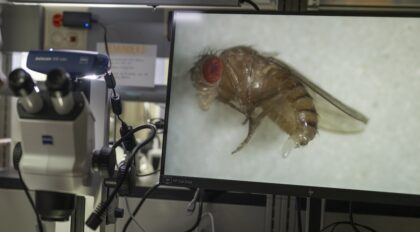
Development in fertility research questions obesity as the leading cause of infertility
A project spearheaded by scientist Rodrigo Dutra Nunes in the Drummond-Barbosa Lab found that a high-sugar diet, and not obesity, causes decreased fertility in fruit flies.
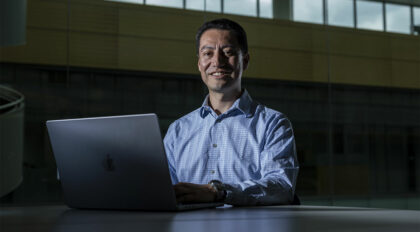
A foundation model for bioimaging? A Morgridge scientist explores the possibilities
Morgridge investigator Juan Caicedo is developing an AI-driven image processing platform called "universal morphology," which has the potential to turbocharge research into cell biology and drug discovery.
Request your copy of the Annual Report
"*" indicates required fields
